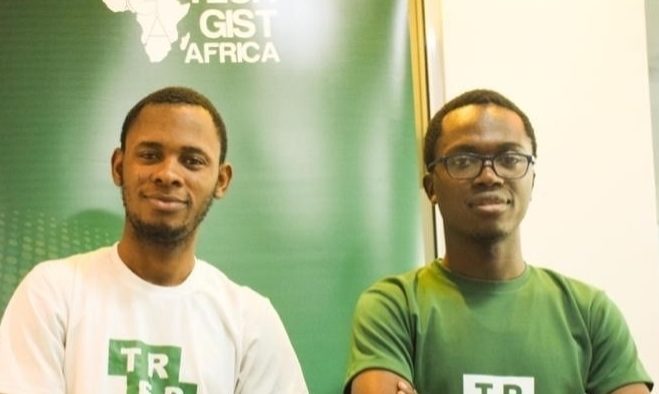
Anzisha fellow, twenty-two year old Abdulwaheed (Abdul) Alayande (right), along with Taofeek Olalekan, is co-founder and product lead at TrepLabs.
Anzisha Fellow Working to Provide Local Information About COVID-19 Spread
Nigerian entrepreneur believes technology will transform healthcare in Africa
Twenty-two year old Abdulwaheed (Abdul) Alayande is a part of the 2019 cohort of Anzisha fellows. He is the founder of TrepLabs. The company has built a product, RealDrip, that makes blood transfusions and drip treatment easier and safer for healthcare professionals. The Anzisha Program is a partnership between the Mastercard Foundation and African Leadership Academy supporting very young entrepreneurs (15 to 22 years old) with job-generating potential.
In response to the COVID-19 pandemic, Abdul and TrepLabs built a platform to provide Nigerians with local information about the spread of the virus.
How old are you? How old is TrepLabs? Why did you co-found this company? How many people work for TrepLabs?
I am 22 years old. TrepLabs is two years old. We started TrepLabs to fix healthcare in Africa by making clinical tools affordable and accessible because we believe nobody deserves to die from preventable illness. We have built RealDrip, a medical device, and software that makes blood transfusion and drip treatment easier, simpler, and safer for medical professionals. It is highly affordable (at a 96% discount to the price of equivalent manufactured in developed Nations). Without this product in Africa, 76,000 pregnant women and 500,000 babies will keep dying every year. At the moment, seven people work at TrepLabs to provide affordable clinical tools. You can check us out at www.treplabs.co
TrepLabs has set up a tool to provide Nigerians with local information about the pandemic? How does it work?
We built both a mobile app and web platform to help sensitize the general public about COVID-19, this also serves as a reporting tool for citizens to report themselves or any suspicious activities related to COVID-19 to the authority for active tracking. We noticed that the emergency response call line would be overwhelmed during this period, so we incorporated a chat system and distributed call setup to help optimize and complement the existing system. The system also features an active map showing the spread of COVID-19 in Nigeria. We currently have over 5000 site visitors daily, which shows that over 5000 people use the platform for information tracking related to COVID-19. The tracking system is available via www.reportcorona.ng
How many cases of COVID-19 are there in Nigeria? What areas have been hardest hit? Why do you think this is?
At the time of this response (Friday, April 3, 2020), there are 184 confirmed cases in Nigeria with 2 fatalities. The good news is that 20 people have recovered so far. Lagos State and the Federal Capital Territory (FCT) are the hardest hit. The two major international airports in the country are located there, and those places are the first point of contact when entering Nigeria.
How is COVID-19 impacting your immediate family, community, friends?
One of the visible impacts of COVID-19 is not business as usual and the economic impact. Our community people work mostly in informal sectors, and the current lockdown poses challenges about their livelihood as they depend on making money daily to feed and sustain their respective families. The effect of the lockdown caused by COVID-19 is that hunger and associated fear might kill people faster than the virus.
What is the biggest challenge facing communities in Nigeria around the COVID-19 pandemic?
The biggest challenge facing communities in Nigeria around the COVID crisis, aside from what I have mentioned in the previous response, is misinformation. Most people believe that COVID-19 is a rich man virus; therefore, they won’t be affected. There is also a trust issue about the authenticity of the virus infection in Nigeria based on the reservations most citizens hold towards the government. Thanks to the lockdown, we can avoid the spread of the virus at the community level.
How is your tool helping mitigate these challenges?
Our system helps mitigates these challenges through sensitization and active report with a map showing the spread of the virus. This is to ensure awareness about COVID-19 and teach people how they can protect themselves. Also, to help find a cure, we’ve built an AI system that matches existing drugs with the protein structure of the COVID-19 to study which drug or combination of drugs can inhibit the virus fatality pending vaccine development.
There have been wonderful stories of innovation throughout the pandemic. Can you say a little about why these contributions are important, especially homegrown African ones?
Innovative contributions during this crisis, especially homegrown African ones, are essentials because most of the technology-driven innovations in Africa are being built in the US or UK, and they don’t fit into our evolving infrastructure. We fit our unique problems into existing solutions rather than creating solutions to our problems. For a long-lasting impact on the continent, homegrown solutions that understand the dynamics of the ecosystem would go a long way to solve problems on the continent.


